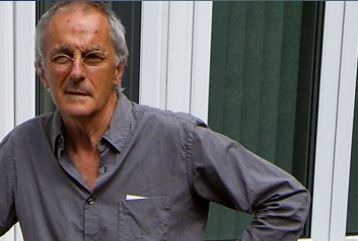Select one or more of these popular tags:
-
In Our Time - The Philosophy of Love
-
Melvyn Bragg
Melvyn Bragg and guests discuss the philosophy of love. With Professor Roger Scruton, author of many books including Sexual Desire; Angie Hobbes, lecturer in philosophy at Warwick University; Thomas Docherty, Professor of English at the University of Kent.
Melvyn Bragg and guests discuss the philosophy of love. With Professor Roger Scruton, author of many books including Sexual Desire; Angie Hobbes, lecturer in philosophy at Warwick University; Thomas Docherty, Professor of English at the University of Kent.
-
In Our Time - The Physics Of Time
-
Melvyn Bragg
Time is integral to our experience of things but we find it very difficult to think about. It may not even exist and yet seems written into the existence of absolutely everything.
Time is integral to our experience of things but we find it very difficult to think about. It may not even exist and yet seems written into the existence of absolutely everything.
-
In Our Time - The Pilgrim Fathers: The Original American Dream
-
Kathleen Burk, Harry Bennett & Tim Lockley
Every year on the fourth Thursday in November, Americans go home to their families and sit down to a meal. It’s called Thanksgiving and it echoes a meal that took place nearly 400 years ago, when a group of English religious exiles sat down, after a brutal winter, to celebrate their first harvest in the New World. They celebrated it in company with the American Indians who had helped them to survive. These settlers are called the Pilgrim Fathers and although they were not the first and certainly not the largest of the early settlements, they have retained a hold on the American imagination far out of proportion to their historical significance
Every year on the fourth Thursday in November, Americans go home to their families and sit down to a meal. It’s called Thanksgiving and it echoes a meal that took place nearly 400 years ago, when a group of English religious exiles sat down, after a brutal winter, to celebrate their first harvest in the New World. They celebrated it in company with the American Indians who had helped them to survive. These settlers are called the Pilgrim Fathers and although they were not the first and certainly not the largest of the early settlements, they have retained a hold on the American imagination far out of proportion to their historical significance
-
In Our Time - The Poincare Conjecture
-
June Barrow-Green, Ian Stewart & Marcus du Sautoy
The French mathematician Henri Poincaré declared: “The scientist does not study mathematics because it is useful; he studies it because he delights in it, and he delights in it because it is beautiful. And it is because simplicity, because grandeur, is beautiful that we preferably seek simple facts, sublime facts, and that we delight now to follow the majestic course of the stars.” Poincaré’s ground-breaking work in the 19th and early 20th century has indeed led us to the stars and the consideration of the shape of the universe itself.
The French mathematician Henri Poincaré declared: “The scientist does not study mathematics because it is useful; he studies it because he delights in it, and he delights in it because it is beautiful. And it is because simplicity, because grandeur, is beautiful that we preferably seek simple facts, sublime facts, and that we delight now to follow the majestic course of the stars.” Poincaré’s ground-breaking work in the 19th and early 20th century has indeed led us to the stars and the consideration of the shape of the universe itself.
-
In Our Time - The Roman Republic
-
Melvyn Bragg
Around 550BC, Lucretia, the daughter of an aristocrat, was raped by the son of Tarquin, the king of Rome. Lucretia told her family what had happened to her and then, in front of them, killed herself from shame. The Roman historian Livy describes what was believed to have happened next:
Around 550BC, Lucretia, the daughter of an aristocrat, was raped by the son of Tarquin, the king of Rome. Lucretia told her family what had happened to her and then, in front of them, killed herself from shame. The Roman historian Livy describes what was believed to have happened next:
-
In Our Time - The Siege of Orleans: Did Joan of Arc Really Rescue France?
-
Anne Curry, Malcolm Vale & Matthew Bennett
Charles VI, a madman and the King of France, was dead and his kingdom hung in the balance. The French aristocracy were at war with each other, English soldiers occupied Paris and Charles’ crown was up for grabs, contested by his own son, the Dauphin, and the seven-year-old King of England, Henry VI. But as the English army pressed down through France, the only thing that seemed to stand between the English King and the French Crown was the city of Orleans.
Charles VI, a madman and the King of France, was dead and his kingdom hung in the balance. The French aristocracy were at war with each other, English soldiers occupied Paris and Charles’ crown was up for grabs, contested by his own son, the Dauphin, and the seven-year-old King of England, Henry VI. But as the English army pressed down through France, the only thing that seemed to stand between the English King and the French Crown was the city of Orleans.
-
In Our Time - The Spanish Civil War
-
Melvyn Bragg
The Spanish Civil War was a defining war of the twentieth century. It was a brutal conflict that polarised Spain, pitting the Left against the Right, the anti-clericals against the Church, the unions against the landed classes and the Republicans against the Monarchists. It was a bloody war which saw, in the space of just three years, the murder and execution of 350,000 people. It was also a conflict which soon became internationalised, becoming a battleground for the forces of Fascism and Communism as Europe itself geared up for war.
The Spanish Civil War was a defining war of the twentieth century. It was a brutal conflict that polarised Spain, pitting the Left against the Right, the anti-clericals against the Church, the unions against the landed classes and the Republicans against the Monarchists. It was a bloody war which saw, in the space of just three years, the murder and execution of 350,000 people. It was also a conflict which soon became internationalised, becoming a battleground for the forces of Fascism and Communism as Europe itself geared up for war.
-
In Our Time - The Spanish Inquisition
-
John Edwards, Alexander Murray & Michael Alpert
The Spanish Inquisition set up in 1478 surpassed all Inquisitorial activity that had preceded it in terms of its reach and length. For 350 years under Papal Decree, Jews, then Muslims and Protestants were put through the Inquisitional Court and condemned to torture, imprisonment, exile and death. How did the early origins of the Inquisition in Medieval Europe spread to Spain? What were the motivations behind the systematic persecution of Jews, Muslims and Protestants? And what finally brought about an end to the Spanish Inquisition 350 years after it had first been decreed?
The Spanish Inquisition set up in 1478 surpassed all Inquisitorial activity that had preceded it in terms of its reach and length. For 350 years under Papal Decree, Jews, then Muslims and Protestants were put through the Inquisitional Court and condemned to torture, imprisonment, exile and death. How did the early origins of the Inquisition in Medieval Europe spread to Spain? What were the motivations behind the systematic persecution of Jews, Muslims and Protestants? And what finally brought about an end to the Spanish Inquisition 350 years after it had first been decreed?
On Monday September 10th 1792 The Times of London carried a story covering events in revolutionary France: "The streets of Paris, strewed with the carcases of the mangled victims, are become so familiar to the sight, that they are passed by and trod on without any particular notice. The mob think no more of killing a fellow-creature, who is not even an object of suspicion, than wanton boys would of killing a cat or a dog".
On Monday September 10th 1792 The Times of London carried a story covering events in revolutionary France: "The streets of Paris, strewed with the carcases of the mangled victims, are become so familiar to the sight, that they are passed by and trod on without any particular notice. The mob think no more of killing a fellow-creature, who is not even an object of suspicion, than wanton boys would of killing a cat or a dog".
-
In Our Time - The Translation Movement
-
Melvyn Bragg
One night in Baghdad, the 9th century Caliph Al-Mamun was visited by a dream. The philosopher Aristotle appeared to him, saying that the reason of the Greeks and the revelation of Islam were not opposed. On waking, the Caliph demanded that all of Aristotle’s works be translated into Arabic. And they were.
One night in Baghdad, the 9th century Caliph Al-Mamun was visited by a dream. The philosopher Aristotle appeared to him, saying that the reason of the Greeks and the revelation of Islam were not opposed. On waking, the Caliph demanded that all of Aristotle’s works be translated into Arabic. And they were.
-
In Our Time - Time
-
Melvyn Bragg
Melvyn Bragg and guests discuss the history of mankind’s attempt to understand the nature of time. With Dr Neil Johnson, theoretical physicist at the Clarendon Laboratory, Oxford University and Royal Institution Christmas Lecturer 1999 on the subject of Time; Lee Smolin, cosmologist and Professor of Physics, Pennsylvania State University.
Melvyn Bragg and guests discuss the history of mankind’s attempt to understand the nature of time. With Dr Neil Johnson, theoretical physicist at the Clarendon Laboratory, Oxford University and Royal Institution Christmas Lecturer 1999 on the subject of Time; Lee Smolin, cosmologist and Professor of Physics, Pennsylvania State University.
-
In Our Time - Trofim Lysenko
-
Melvyn Bragg
In 1928, as America heads towards the Wall Street Crash, Joseph Stalin reveals his master plan - nature is to be conquered by science, Russia to be made brutally, glitteringly modern and the world transformed by communist endeavour. Into the heart of this vision stepped Trofim Lysenko, a self-taught geneticist who promised to turn Russian wasteland into a grain-laden Garden of Eden.
In 1928, as America heads towards the Wall Street Crash, Joseph Stalin reveals his master plan - nature is to be conquered by science, Russia to be made brutally, glitteringly modern and the world transformed by communist endeavour. Into the heart of this vision stepped Trofim Lysenko, a self-taught geneticist who promised to turn Russian wasteland into a grain-laden Garden of Eden.
-
In Our Time - Utopia
-
Melvyn Bragg
Melvyn Bragg and guests discuss the concept of Utopia. With Dr Anthony Grayling, human rights campaigner, lecturer in philosophy at Birkbeck College, London and Fellow of St Anne’s College, Oxford; John Carey, distinguished critic, journalist, broadcaster, Merton Professor of English, Oxford University and editor of, The Faber Book of Utopias.
Melvyn Bragg and guests discuss the concept of Utopia. With Dr Anthony Grayling, human rights campaigner, lecturer in philosophy at Birkbeck College, London and Fellow of St Anne’s College, Oxford; John Carey, distinguished critic, journalist, broadcaster, Merton Professor of English, Oxford University and editor of, The Faber Book of Utopias.
-
In Our Time - Victorian Realism
-
Melvyn Bragg
A reaction against Romanticism, the realist novel presented life as it was in urbanized, industrial Britain. Attacked as ordinary, mundane, overly democratic and lacking the imaginative demands of poetry, its defendants argued that the ordinariness of life contained a complexity and depth previously unseen and unconsidered. At its best the realist novel was like life itself - complex in appearance, rich in character, diverse in outlook, teeming with ideas and operating on several levels. It was a forum for the confusions of the Victorian age over Christianity and Darwinism, economics, morality and psychology, yet it was also a domestic novel concerned with the individuality of human relationships.
A reaction against Romanticism, the realist novel presented life as it was in urbanized, industrial Britain. Attacked as ordinary, mundane, overly democratic and lacking the imaginative demands of poetry, its defendants argued that the ordinariness of life contained a complexity and depth previously unseen and unconsidered. At its best the realist novel was like life itself - complex in appearance, rich in character, diverse in outlook, teeming with ideas and operating on several levels. It was a forum for the confusions of the Victorian age over Christianity and Darwinism, economics, morality and psychology, yet it was also a domestic novel concerned with the individuality of human relationships.
-
In Our Time - Vitalism
-
Melvyn Bragg
Frankenstein may seem an outlandish tale, but Mary Shelley wrote it when science was alive with ideas about what differentiated the living from the dead. This was Vitalism, a belief that living things possessed some spark of life, some vital principle that lifted them above dull matter. Electricity was a very real candidate.
Frankenstein may seem an outlandish tale, but Mary Shelley wrote it when science was alive with ideas about what differentiated the living from the dead. This was Vitalism, a belief that living things possessed some spark of life, some vital principle that lifted them above dull matter. Electricity was a very real candidate.
-
In Our Time - War in the 20th Century
-
Melvyn Bragg
With Michael Ignatieff, writer, broadcaster and biographer of Isaiah Berlin; Sir Michael Howard, formerly Regius Professor of History, Oxford University and joint editor of the new Oxford History of the Twentieth
With Michael Ignatieff, writer, broadcaster and biographer of Isaiah Berlin; Sir Michael Howard, formerly Regius Professor of History, Oxford University and joint editor of the new Oxford History of the Twentieth
As part of the BBC's year of science programming, Melvyn Bragg looks at the history of the oldest scientific learned society of them all: the Royal Society.Episode one travels to Oxford, where the young Christopher Wren and friends experimented.
As part of the BBC's year of science programming, Melvyn Bragg looks at the history of the oldest scientific learned society of them all: the Royal Society.Episode one travels to Oxford, where the young Christopher Wren and friends experimented.
How Newton tested the lines between government-funded research and public access.
How Newton tested the lines between government-funded research and public access.
The 19th century blooms scientifically with numerous alternative, specialist societies.
The 19th century blooms scientifically with numerous alternative, specialist societies.
The more discreet role played by the Society in the 20th century.
The more discreet role played by the Society in the 20th century.
-
In Our Time -The School of Athens
-
Melvyn Bragg
Melvyn Bragg and guests discuss The School of Athens – the fresco painted by the Italian Renaissance painter, Raphael, for Pope Julius II’s private library in the Vatican. The fresco depicts some of the most famous philosophers of ancient times, including Aristotle and Plato, engaged in discussion amidst the splendour of a classical Renaissance chamber. It is considered to be one of the greatest images in Western art not only because of Raphael’s skill as a painter, but also his ability to have created an enduring image that continues to inspire philosophical debate today.
Melvyn Bragg and guests discuss The School of Athens – the fresco painted by the Italian Renaissance painter, Raphael, for Pope Julius II’s private library in the Vatican. The fresco depicts some of the most famous philosophers of ancient times, including Aristotle and Plato, engaged in discussion amidst the splendour of a classical Renaissance chamber. It is considered to be one of the greatest images in Western art not only because of Raphael’s skill as a painter, but also his ability to have created an enduring image that continues to inspire philosophical debate today.
-
Losing the Past 1
-
Richard Hollingham
What is being done to stop more data being lost in the future, now that we've all gone digital: from an Internet Archive, to the preservation of government emails, and from concrete bunkers for nitrate films to a unique newspaper repository. For example, the US national archives have to make sure they keep all federal government emails. The Clinton White House alone produced 32 million emails, while those of his administration as a whole run into billions. President Clinton himself only ever wrote one email while in office. Who to? Richard Hollingham can reveal all....
What is being done to stop more data being lost in the future, now that we've all gone digital: from an Internet Archive, to the preservation of government emails, and from concrete bunkers for nitrate films to a unique newspaper repository. For example, the US national archives have to make sure they keep all federal government emails. The Clinton White House alone produced 32 million emails, while those of his administration as a whole run into billions. President Clinton himself only ever wrote one email while in office. Who to? Richard Hollingham can reveal all....
-
Losing the Past 2
-
Richard Hollingham
A timely investigation into the loss of cultural, public and historical records, both analogue and digital, as a result of deterioration or advances in technology. Richard Hollingham investigates specific examples of what is now unplayable or unreadable. For example, he can reveal for the first time, that the UK population census data from 1951 are lost, as are significant parts of the 1961 and 1971 census data. And he hears from the long-term percussionist of The Grateful Dead, Mickey Hart, why the Grateful Dead, unlike other leading touring bands, still have all their master tapes intact. He also finds out about successful efforts on both sides of the Atlantic for preserving and recuperating sound and music.
A timely investigation into the loss of cultural, public and historical records, both analogue and digital, as a result of deterioration or advances in technology. Richard Hollingham investigates specific examples of what is now unplayable or unreadable. For example, he can reveal for the first time, that the UK population census data from 1951 are lost, as are significant parts of the 1961 and 1971 census data. And he hears from the long-term percussionist of The Grateful Dead, Mickey Hart, why the Grateful Dead, unlike other leading touring bands, still have all their master tapes intact. He also finds out about successful efforts on both sides of the Atlantic for preserving and recuperating sound and music.
-
Mozart Effect
-
Ian Peacock
Why does the music of Mozart create as much excitement in the laboratory as it does in the concert hall? This programme investigates the myths and reality of Mozart's mind and his music.
Why does the music of Mozart create as much excitement in the laboratory as it does in the concert hall? This programme investigates the myths and reality of Mozart's mind and his music.
-
Planet Earth Under Threat
-
Gabrielle Walker
The final part of the series exploring how climate change is affecting the natural world.
The final part of the series exploring how climate change is affecting the natural world.
-
Power Failure at the Central Bank
-
Robert Peston
Business editor Robert Peston examines the crisis in the international banking system. For the last six decades, central bankers from the most developed countries have managed the global economy, manipulating international finances with the aid of a powerful set of economic levers handed to them after the Second World War. Last year the levers became disconnected from the machinery and the central banking system has suffered a severe loss of power
Business editor Robert Peston examines the crisis in the international banking system. For the last six decades, central bankers from the most developed countries have managed the global economy, manipulating international finances with the aid of a powerful set of economic levers handed to them after the Second World War. Last year the levers became disconnected from the machinery and the central banking system has suffered a severe loss of power
-
Professor Steve Jones : The House I Grew Up In
-
Wendy Robbins
Wendy Robbins presents a series revisiting the childhood neighbourhoods of influential Britons. Biologist and author Professor Steve Jones takes Wendy back to his childhood in west Wales in the 1950s to uncover the passions that led to his life of scientific discovery. Biologist and author Professor Steve Jones takes Wendy back to his childhood in west Wales in the 1950s to uncover the passions that led to his life of scientific discovery.
Wendy Robbins presents a series revisiting the childhood neighbourhoods of influential Britons. Biologist and author Professor Steve Jones takes Wendy back to his childhood in west Wales in the 1950s to uncover the passions that led to his life of scientific discovery. Biologist and author Professor Steve Jones takes Wendy back to his childhood in west Wales in the 1950s to uncover the passions that led to his life of scientific discovery.
-
Rebel Without A Cause – The James Dean Story
-
Johnny Depp
James Dean is the eternal youthful rebel - the movie idol blessed with the looks, style, talent and attitude that captivated a generation. To mark the 50th anniversary of his death at the wheel of his Porsche on September 30 1955, Johnny Depp presents this profile of one of Hollywood's most popular icons.
James Dean is the eternal youthful rebel - the movie idol blessed with the looks, style, talent and attitude that captivated a generation. To mark the 50th anniversary of his death at the wheel of his Porsche on September 30 1955, Johnny Depp presents this profile of one of Hollywood's most popular icons.
-
Redesigning the Human Body - The Skin We're in
-
Len Fisher
Len Fisher wonders how the body would work if we had a go at remaking ourselves. Len confronts his reflection, and dreams about what he could do to make his skin more appealing.
Len Fisher wonders how the body would work if we had a go at remaking ourselves. Len confronts his reflection, and dreams about what he could do to make his skin more appealing.
A hundred years on from Albert Einstein's 'miracle year' of 1905, Radio 4 talks to writers and artists who have wrestled with the scientific legacy of modern physics in their work. Michael Frayn's acclaimed stage play, Copenhagen, opened at the National Theatre in 1998. The story of a meeting between two theoretical physicists during the early years of Second World War, it's been hailed as the most successful use of science on the stage.
A hundred years on from Albert Einstein's 'miracle year' of 1905, Radio 4 talks to writers and artists who have wrestled with the scientific legacy of modern physics in their work. Michael Frayn's acclaimed stage play, Copenhagen, opened at the National Theatre in 1998. The story of a meeting between two theoretical physicists during the early years of Second World War, it's been hailed as the most successful use of science on the stage.






























